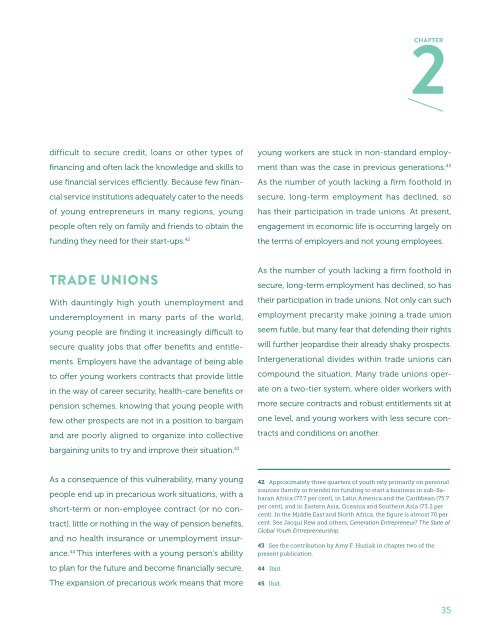YOUTH CIVIC
JieguI2U
JieguI2U
Create successful ePaper yourself
Turn your PDF publications into a flip-book with our unique Google optimized e-Paper software.
2CHAPTER<br />
difficult to secure credit, loans or other types of<br />
financing and often lack the knowledge and skills to<br />
use financial services efficiently. Because few financial<br />
service institutions adequately cater to the needs<br />
of young entrepreneurs in many regions, young<br />
people often rely on family and friends to obtain the<br />
funding they need for their start-ups. 42<br />
young workers are stuck in non-standard employment<br />
than was the case in previous generations. 45<br />
As the number of youth lacking a firm foothold in<br />
secure, long-term employment has declined, so<br />
has their participation in trade unions. At present,<br />
engagement in economic life is occurring largely on<br />
the terms of employers and not young employees.<br />
TRADE UNIONS<br />
With dauntingly high youth unemployment and<br />
underemployment in many parts of the world,<br />
young people are finding it increasingly difficult to<br />
secure quality jobs that offer benefits and entitlements.<br />
Employers have the advantage of being able<br />
to offer young workers contracts that provide little<br />
in the way of career security, health-care benefits or<br />
pension schemes, knowing that young people with<br />
few other prospects are not in a position to bargain<br />
and are poorly aligned to organize into collective<br />
As the number of youth lacking a firm foothold in<br />
secure, long-term employment has declined, so has<br />
their participation in trade unions. Not only can such<br />
employment precarity make joining a trade union<br />
seem futile, but many fear that defending their rights<br />
will further jeopardise their already shaky prospects.<br />
Intergenerational divides within trade unions can<br />
compound the situation. Many trade unions operate<br />
on a two-tier system, where older workers with<br />
more secure contracts and robust entitlements sit at<br />
one level, and young workers with less secure contracts<br />
and conditions on another.<br />
bargaining units to try and improve their situation. 43<br />
As a consequence of this vulnerability, many young<br />
people end up in precarious work situations, with a<br />
short-term or non-employee contract (or no contract),<br />
little or nothing in the way of pension benefits,<br />
and no health insurance or unemployment insurance.<br />
44 This interferes with a young person’s ability<br />
to plan for the future and become financially secure.<br />
The expansion of precarious work means that more<br />
42 Approximately three quarters of youth rely primarily on personal<br />
sources (family or friends) for funding to start a business in sub-Saharan<br />
Africa (77.7 per cent), in Latin America and the Caribbean (75.7<br />
per cent), and in Eastern Asia, Oceania and Southern Asia (73.2 per<br />
cent). In the Middle East and North Africa, the figure is almost 70 per<br />
cent. See Jacqui Kew and others, Generation Entrepreneur? The State of<br />
Global Youth Entrepreneurship.<br />
43 See the contribution by Amy F. Huziak in chapter two of the<br />
present publication.<br />
44 Ibid.<br />
45 Ibid.<br />
35


